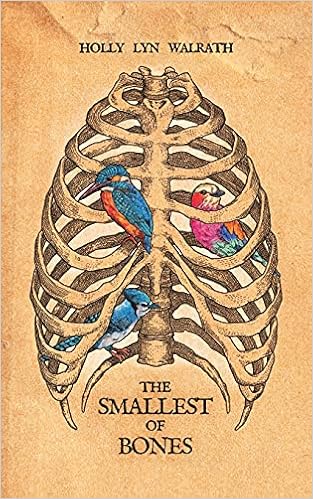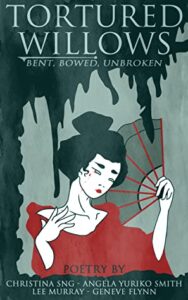Book Review: Tortured Willows: Bent. Bowed. Unbroken. by Lee Murray, Geneve Flynn, Christina Sng, and Angela Yuriko Smith
Tortured Willows: Bent. Bowed. Unbroken. by Lee Murray, Geneve Flynn, Christina Sng, and Angela Yuriko Smith
Yuriko Publishing, 2021
ISBN: 9781737208
Available: Paperback (Amazon.com)
A striking, heart-wrenching masterpiece, comprised of four vital voices in verse.
This four-poet compilation of works extends on themes addressed in the multiple award winning anthology, Black Cranes: Tales of Unquiet Women (Lee Murray and Geneve Flynn, editors). The individual poems are highly accessible and strike fiercely, each bringing to life “a story on skin” (Angela Yuriko Smith, “Her Hajichi”), and each written with unyielding voice and unique strength.
At once painful and powerful, the collection as a whole exemplifies the best of speculative poetry and is a collection that will be re-read again and again: first all at once because the poems bring you quickly into their vivid images and worlds, and then returned to over time for their courageous meanings and profound insights.
Highlights includes Murray’s “Defining Character,” which explores language itself and the associations inherent to female life; Flynn’s remarkable blackout poem “Abridge,” unearthing hidden realities and hopes for an end to gendered violence”; the harsh cruelties imposed by the wealthy on a young immigrant girl employed in the home in Sng’s “Phoenix.”
Alongside a combination of traditional forms and free verse work, the poets also offer short commentaries. This addition invites readers into deeper reflection on and conversation with the authors’ processes and purposes, an engaging and inspired aspect of the collection. Filled with diverse poems that explore complex themes like ancestral obligations, cultural appropriation and violence, intimate exotification and misogyny, the impact of the work also moves in intriguing, new directions toward empowering, reimagined histories and myths.
Beautifully arranged by individual author, each set of poems works on its own and contributes to the overall themes. The resulting range of voices and styles is merged into a magnificently cohesive set addressing intersecting issues of culture and gender. Potent truths, rich details, and dynamic verse, these poems bloom with taut images that slice away preconceptions and deepen attention to appropriations of heritage and impositions of restricting expectations.
Fans of Black Cranes looking for more work by the authors, as well as fans of modern speculative verse and horror poetry will revel in this impressive collection. From goddesses and teenagers to angry ghosts, these poems will haunt and inspire. Highly Recommend.
Reviewed by E.F. Schraeder
Book Review: The Smallest of Bones by Holly Lyn Walrath

The Smallest of Bones by Holly Lyn Walrath
Clash Books, 2021
ISBN-13: 978-1944866952
Available: Paperback ( Bookshop.org | Amazon.com )
“If you strip me down to my bones / am I yours?” the speaker asks, in Holly Ryn Walrath’s poetry collection The Smallest of Bones. Groups of poems divided into sections called Cranium, Mandible, Sternum, Sacrum, Spine, Calcaneus, and Temporal provide a larger osteo-literary structure into which the poems slip like so many small bones surrounding the artistic organs of thought and emotion.
Sometimes surprising, often disturbing and provocative, these poems are the life-blood emerging from the marrow of meaning. There are vivid images of “ocean eyes” and “demon’s tongue,” a couple symbolized as “the tree burning after” and “condemned women” as metaphorical “rare birds” who should be studied. One speaker asks, “hold me under your tongue / like unspoken regret,” another confesses, “I carry my face in my pocket.”
There are many memorable lines to savor throughout the collection. Some of these rhyme: “the smallest of bones / is a part of the hammer in your ear / love is a heartbreak you can hear.” Some are startling: “ask me, where is your wild woman? I shot her in the face” and “wouldn’t you rather be something violent if you had the choice?”
Walrath also considers love, but it is not in the usual terms. In the moment of connection, “his hands tensile slipping under my radar my heart was sonar,” the speaker remembers, and “to love so much your body changes / curving together like two halves of the taijitu or the earth and the moon / must be dreadful and excruciating,” reflects another.
Walrath also comments on many other topics like sex and gender, physical attraction, memories, science, ghosts, birds, parasites, the nature of women, death, dreams, pain, bodies, flowers and writing. Even the Table of Contents, composed of the section headings and first lines of the poems, can be read as a poem. Try it!
“I wrap bone chains around your head,” Walrath writes. Yes, she does, and I recommend it.
Reviewed by Nova Hadley





Follow Us!